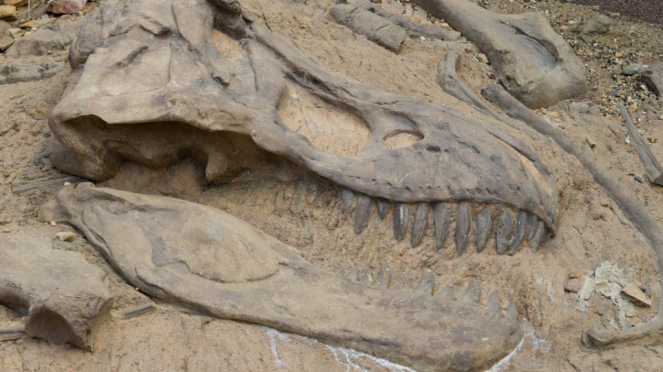Senin, 11 Juli 2022 – 14:24 WIB
VIVA – A species of giant dinosaur called Meraxes gigas has been discovered by researchers. It is known, the shape of this dinosaur is similar to the T-rex. However, this Meraxes gigas has very short forelegs. It has predicted because the two dinosaurs evolved separately on their journey.
Not only that, it is also estimated that this species became extinct in the late Cretaceous or about 20 million years before T-rex was present. It means that these two dinosaur species lived at different times.
“This group evolved and reached the peak of diversity just before [it] went extinct,” Juan Canale, a paleontologist from the Ernesto Bachmann Museum of Paleontology, Argentina remarked.
Quoted from the Sciencealert website on Sunday, July 10, 2022, Meraxes gigas belongs to a group of dinosaurs known as Carcharodontosaurids. A large theropod predatory dinosaur that featured hollow bones and was some of the largest predators ever to have existed on Earth.
“This fossil from Meraxes gigas has never been seen before, complete bones like hands and feet help us understand the evolutionary and anatomical trends of Carcharodontosaurids” Canale said.

Based on an analysis of the fossils found in northern Patagonia, Argentina. Researchers estimate the dinosaur died at the age of 45, and was about 11 meters long and weighed more than four tons.
From the skeletal remains, researchers estimate, the forearm has strong muscles, so it doesn’t appear to be due to lack of function that the arm has shrunk to a smaller size.
“It may use the arms for reproductive behaviors such as holding the female during mating or supporting to get back up after a break or fall.” Canale added.
The researchers also confirmed there are some sort of survival features behind it, the research team thought but these tiny muscular arms probably weren’t used for hunting. Instead, the large head usually the main hunting weapon, as the case with the T-rex.
Further discoveries including a series of crests, protrusions, grooves and small horns in the skulls of these Meraxes gigas probably didn’t appear until they reached adulthood, and were very likely meant to attract mates.
According to the team that found the discovery, it’s possible for the Meraxes gigas fossil to help answer more questions about the evolution of dinosaur species, and how different types of dinosaurs could have evolved in the same way.
Artikel ini bersumber dari www.viva.co.id.